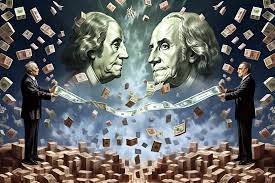Author: Dylan Matthews
Affiliation: VOX Media
Organization/Publisher: VOX Media
Date/Place: April 16, 2020/ USA
Type of Literature: In-depth Report
Word Count: 4630
Link: https://www.vox.com/future-perfect/2019/4/16/18251646/modern-monetary-theory-new-moment-explained
Keywords: Green New Deal, MMT, Heterodox Economics, US Dollar, Government Spending
Brief:
Modern Monetary Theory (MMT) has become a serious challenger to mainstream economic theories governing fiscal and monetary policy in the United States. Leftists including some congress members from the Democratic party are hailing these economic theories as a way of solving inequality in the United States. In this article, the author gives a concise breakdown of what MMT is exactly. Those on the left advocating national healthcare, free tuition, and stronger welfare programs were always criticized by Republicans that such policies will result in either raising taxes or increasing the deficit. MMT explains why concerns like balancing the budget and debt, which burden currency users (such as households and corporations) are not threats to currency issuers such as sovereign governments who mint their own money. This article gives us an insight into how the US government can print six trillion dollars in stimulus money overnight. In fact, according to MMT advocates, the government has always been doing this in times of crises and wars. And simply printing money overnight does not have any negative effects on the economy other than increasing the money supply. The only limitation on printing your own money is inflation. However, this threat is a pseudo-threat against the US dollar which serves as the world reserve currency. The government can never simply run out of money or go bankrupt because it can always print more money. When we look at what is actually happening with our monetary system under fiat currencies, MMTers argue that governments can do more to help their people. For example, they can give a job guarantee (working for the government) to anyone who wants one. The growth in popularity in MMT has many political implications. First, it renders the Federal Reserve useless because MMT advocates keeping interest rates at zero. But the largest impact of MMT is the promise to use deficit spending and lower taxes in order to provide more welfare and wealth distribution. MMT economists polarize the differences between the left and the right in America and at the same time make explicit American Exceptionalism.
By: M. Üveys Han, CIGA Senior Research Associate




